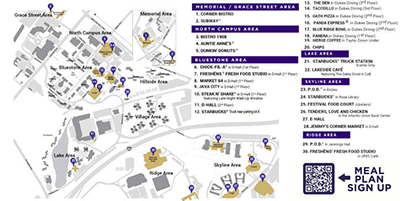Guide to Managing Food Allergies
Guide to Managing Food Allergies
At JMU Dining, we believe that good nutrition is essential to good health. That’s why we are committed to nourishing each and every student by providing them with balanced and nutritious foods every day.
OUR PHILOSOPHY
JMU Dining is committed to providing nutritious options that fit our students needs, no matter where they dine on campus. We support students with food allergies by providing the knowledge and resources necessary for them to make empowered food choices in our dining locations.
Our goal is to provide students with the tools and support that they need to utilize the dining halls safely while being active in the management of their food allergy(ies) or food-related medical condition(s). We take into account each individual student’s personal dietary needs and make every effort to help students transition into their new life at James Madison University.
OUR ENVIRONMENT
With 30 dining locations across campus, ranging from all-you- care-to-eat locations to grab- and-go retail options, JMU Dining offers unmatched variety.
Community dining is an important part of creating new experiences on campus. Both of our all-you-care-to-eat dining halls (D-Hall & E-Hall) are community dining settings with some stations being self-serve. Because of this style of dining, cross-contact of food is possible.
On our end, we take care to reduce cross-contact as much as possible. We educate all of our employees on the dangers of cross-contact in service and production. Our employees participate in an ANAB accredited food allergen and gluten free training called AllerTrain.
YOUR MANAGEMENT
You are the most important advocate for your own health. Please review your responsibilities when managing a food allergy in our dining locations.
Connect with our registered dietitian. Learn how to navigate our dining locations with ease.
Consult with Office of Disability Services (jmu.edu/ods) for additional accommodations, if necessary.
Be proficient in the self-management of your food allergy(ies) or food- related health condition(s).
Avoid foods to which you are allergic.
Recognize the symptoms of allergic reactions.
Know how and when to tell someone that you may be having an allergy-related problem.
Know how to properly use prescribed medication(s) to treat an allergic reaction.
Carry emergency contact information with you.
If you have questions about ingredients in a particular food, direct your questions to our registered dietitian, chef(s), or ask any manager on duty.
If you do not know who these individuals are, please ask a cashier to contact the chef or manager on duty to assist you.
In case of any exposure, carry your medication (ex. EpiPen) with you at all times.
Consider informing friends you normally dine with about your medical needs in case of an emergency.
***Please note: JMU Dining has stock epinephrine at our residential dining locations (D-Hall & E-Hall) as an emergency precaution. You should still carry your prescribed epinephrine with you at all times.
YOUR RESOURCES
An Individual Informational Meeting with Our On-site Registered Dietitian
Meet with our registered dietitian to develop an individualized plan to navigate the residential dining facilities.
The Chef & Manager(s) on Duty The chef and/or manager(s) on duty are available in our dining locations to address on-site questions and concerns.
Access to Manufacturer Provided Ingredient Labels and Nutrition Information
Contact our on-site registered dietitian about specific products you are interested in reviewing.
Fresh Gloves, Utensils, or Pans Upon request employees at made-to-order stations will use separate equipment (when applicable) to reduce cross-contact concerns.
Access to the Worry-Free Zone The Worry-Free Zone is an isolated, locked pantry stocked with peanut-, tree nut-, and gluten-free products. Students who are medically required to limit or avoid these food items should reach out to our registered dietitian to gain access.
JMU Dining utilizes our website to keep students in the loop about what’s happening on campus.
Online Menus
Our interactive menus allow you to view daily or weekly selections, giving you the power to plan your meals in advance. Clicking on individual menu items will also open nutrition, ingredient, and allergen information.
You can add items to the meal calculator.
General Dining Information
Location Hours
Staff Contact Information Upcoming Events
Social Media Accounts Student Initiatives
Health & Wellness Sustainability
Menu icons found on online and in-person menus can be a helpful tool for navigating dietary restrictions.
| |
A style of cooking and eating emphasizing healthy plants at the center of the plate. May contain a proportionally small quantity of animal protein. | |
Whole grains are a leading ingredient in this item. | |
| |
Contains no meat, fish, or poultry. | |
Certified climate- friendly by the World Resources Institute. They have a low impact on the climate, making them a delicious way to help the planet. *Selections made with ingredients that do not contain gluten. |
|
| |
Contains no animal products of any kind. | |
*Selections made with ingredients that do not contain gluten. | |
| Lower in calories, saturated fat, and sodium AND at least one full serving of nutritionally dense ingredients like vegetables, lean protein, whole grains or fresh greens. | *IMPORTANT: Foods prepared without gluten containing ingredients may not be “gluten-free” as recipes are prepared in open kitchens where cross-contact is possible. Aramark relies on its manufacturers’ ingredient listings in determining whether an ingredient contains gluten. |
KNOW THE LINGO
Knowing the lingo used in our dining locations will make your dining experience a breeze!
True Balance
True Balance stations omit the top 9 food allergens and gluten. The menu items served at this station are prepared in a dedicated space using dedicated equipment by employees who have completed allergen and gluten-free training. True Balance stations are located at D-Hall & E-Hal
Worry- Free Zone
The Worry-Free Zone is an isolated, locked pantry stocked with peanut-, tree nut-, and gluten-free products located in D-Hall. Students who are medically required to limit or avoid peanuts, tree nuts, and/or gluten should reach out to our registered dietitian to gain access to the pantry.
ALLERGY INFORMATION
Always carefully read the menu.
Ingredients and nutrition information can be made available to you upon request for all the foods you wish to eat to ensure you are properly avoiding your specific food allergy.
Take extra care with manufacturer- produced goods.
Always read the ingredients labels on any packaged products, as many ingredients may be subject to change without notification.
Fish Allergies
Entrées with fish as an ingredient are occasionally on the menu. Some dishes may also contain fish
sauce, Worcestershire sauce, curry paste or Caesar dressing.
Shellfish Allergies
Entrées and soups with shellfish as an ingredient are sometimes on the menu.
Sesame Allergies
Sesame is found in the hummus served daily at multiple locations across campus including the deli stations. Sesame bagels are served at breakfast at multiple locations on campus.
Allergies
Peanut oil is used at Chick-Fil-A.
Our other dining locations use a vegetable oil blend for frying.
Peanuts are often used in our bakeries. Students with peanut allergies are advised to take caution with bakery items.
Tree Nut Allergies
Tree nuts may be present in select dessert items.
Students with a tree nut allergy are advised to take caution with bakery items and any menu items that contain coconut or coconut milk.
Vegan cheeses often contain tree nuts.
Soy Allergies
JMU Dining uses oil that contains soybeans for cooking and frying. However, this oil is refined and excludes the protein in soy that causes allergic reactions. We consider this oil safe for students with soy allergies.
However, we recognize that soybean oil may still be a concern. True Balance cooks using olive oil.
Egg Allergies
Eggs are present in baked goods and mayonnaise. Students with egg allergies are asked to take caution with baked goods. Take caution with deep- fried foods, which may have been fried with recycled oil used to fry food items coated with egg.
Milk Allergies
Milk alternatives (such as soy or almond) are available throughout campus including our residential and retail locations. Many bakery and manufactured products may contain milk as an ingredient.
Wheat Allergies
Made without gluten cereal is available daily and made without gluten bread, buns, and pizza crust are available upon request at multiple locations across campus.
A variety of gluten free products are available at our convenience store locations.
*Foods commonly prepared without gluten containing ingredients may not be “gluten-free.” Our recipes are prepared in open kitchens where cross-contact is possible and where ingredient substitutions are sometimes made. Aramark relies on its manufacturers’ ingredient
listings in determining whether an ingredient contains gluten.
JMU Dining




